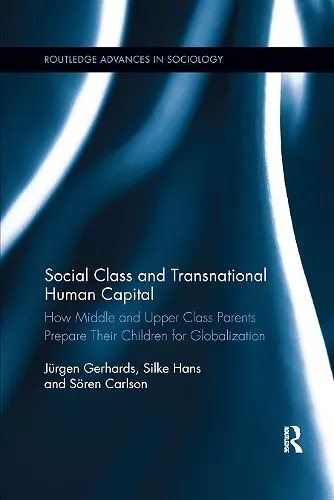Social Class and Transnational Human Capital
How Middle and Upper Class Parents Prepare Their Children for Globalization
Jürgen Gerhards author Sören Carlson author Hans Silke author
Format:Paperback
Publisher:Taylor & Francis Ltd
Published:12th Dec '19
Currently unavailable, and unfortunately no date known when it will be back
This paperback is available in another edition too:
- Hardback£145.00(9781138232020)

Due to globalization processes, foreign language skills, knowledge about other countries and intercultural competences have increasingly become important for societies and people’s social positions. Previous research on social inequality, however, has dominantly focused on the reproduction of class structures within the boundaries of a particular nation-state without considering the importance of these specific skills and competences.
Within Social Class and Transnational Human Capital authors Gerhards, Hans and Carlson refer to these skills as ‘transnational human capital’ and ask to what extent access to this increasingly sought-after resource depends on social class. Based on Pierre Bourdieu’s theory of class, they investigate this question via both quantitative and qualitative empirical analyses. In doing so the authors focus, among other examples, on the so-called school year abroad, i.e. students spending up to a year abroad while attending school – a practice which is rather popular in Germany, but also quite common in many other countries. Thus, this insightful volume explores how inequalities in the acquisition of transnational human capital and new forms of social distinction are produced within families, depending on their class position and the educational strategies parents pursue when trying to prepare their children for a globalizing world.
An enlightening title, this book will appeal to undergraduate and postgraduate students, as well as postdoctoral researchers interested in fields such as sociology, social inequality research, globalization studies and educational studies.
This is a rigorous and empirically-rich study of the ways in which families go about accumulating transnational human capital – focussing, in particular, on the role of bilingual pre-school education and programmes that allow school children to spend up to a year abroad. It emphasises how access to such schemes is socially-patterned, and thus the important role they play in reproducing social inequalities across society. This is an important book for sociologists of education and others interested in the social impact of initiatives to ‘internationalise’ education.
Rachel Brooks, Professor of Sociology, University of Surrey
How does social reproduction change in an age of international mobility? Delving into a variety of original sources, Gerhards, Hans and Carlson’s book disentangles the strategies adopted by middle-upper class European families struggling to push their children into the ranks of the winners of globalization. An illuminating read.
Ettore Recchi, Sciences Po Paris
This book provides a convincing theoretical and empirical perspective on the generation of inequality of transnational capital over the life course. Globalization has turned transnational human capital into an increasingly important individual resource. Those who speak foreign languages, possess intercultural skills or have acquired experiences abroad clearly have an edge on globalized labor markets today. Using a multimethod approach, the book offers a rich empirical analysis addressing the question of how transnational human capital depends on social class, as well as how this relationship is brought about within families and educational institutions. This is a must-read for everyone interested in emerging new forms of educational inequalities in modern societies.
Hans-Peter Blossfeld, European University Institute, Florence
Once again, the innovative empiricist, Jürgen Gerhards, leads a pathbreaking project beyond the bounds of standard national models in the sociology of inequality and culture. Updating Bourdieu for a more complex, Europeanised and global society, Gerhards, Hans and Carlson convincingly mix survey data, interviews and media content analysis, to show how, when and why the children of elites use and reproduce what the authors term ‘transnational human capital’.
Adrian Favell, Chair in Sociology and Social Theory, University of Leeds
ISBN: 9780367884178
Dimensions: unknown
Weight: 400g
216 pages